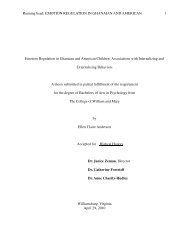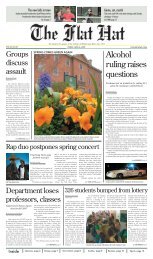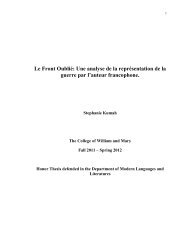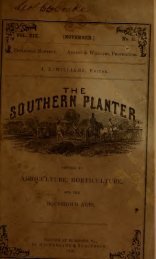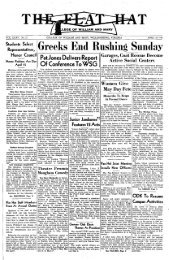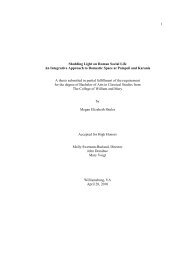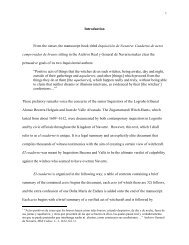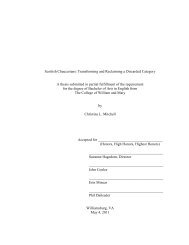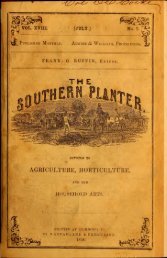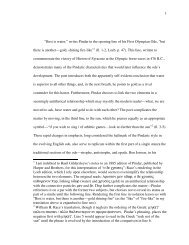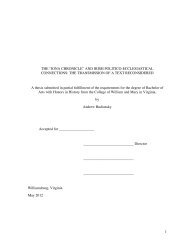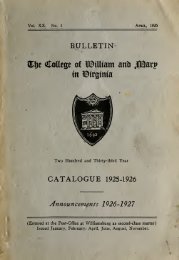Southern planter - The W&M Digital Archive
Southern planter - The W&M Digital Archive
Southern planter - The W&M Digital Archive
You also want an ePaper? Increase the reach of your titles
YUMPU automatically turns print PDFs into web optimized ePapers that Google loves.
1«59.] THE SOUTHERN PLANTER 407<br />
the line it is capable of reaching, as the<br />
present standard of Agricultural education<br />
is below that high standard to which Mr.<br />
Everett directs the ambition of the American<br />
farmer, there are good grounds for the<br />
opinion, that with the increase of an Agricultural<br />
literature, the diffusion of books<br />
and newspapers, of farmers' clubs, of State,<br />
county, and town, Agricultural Societies, of<br />
national and local fairs and exhibitions,<br />
there is a perceptible and repaid improvement<br />
in the rural economy of the country,<br />
in the intelligent culture of the soil, and in<br />
the profits of Agricultural capital.<br />
So long ago as 1795, Mr. Burke placed<br />
the proper profits of a proprietor of 1,200<br />
acres at 12 per cent. Sir John Sinclair a<br />
quarter of a century later, declared the<br />
proper profits at 10 to 15 per cent. Mr.<br />
Rives, of Virginia, by whom these facts<br />
were mentioned in a very inleresting Agri-<br />
cultural address, stated the profit of the<br />
model farin at Gignon, near Versailles, at 14<br />
per cent. <strong>The</strong> " Revue des deux Mondes "<br />
for February 15th, 1858, in an article entitled,<br />
" Les Questions Agricoles en 1848,"<br />
mentions that the net profits of the farm at<br />
Bresles, in the department of the Oise, rose<br />
in 1856, to 246,000 francs upon a capital of<br />
800,000 being more than 30 per cent.<br />
Occasional accounts in our Agricultural<br />
papers indicate a rate of interest, which if<br />
verified as one that could be reasonably an-<br />
ticipated with a due share of skill and in-<br />
dustry, would immediately induce the investment<br />
of millions of capital in Agricultural<br />
operations, to the benefit of the coun-<br />
try at large, as well as to the individuals<br />
making the advances.<br />
One point that should not be lost sight of<br />
in a consideration of the advantages attend-<br />
ant upon agricultural operations is the safety<br />
of the capital iuvested, compared with<br />
the chances of loss attendant upon commercial<br />
or manufacturing investments. <strong>The</strong><br />
Hon. Emory Washburne, of Massachusetts,<br />
in an address before the Worcester Agricul-<br />
tural Society, in 1854, stated some facts<br />
bearing upon the question, which a statistical<br />
inquiry, if one could be accurately made,<br />
into the successes or reverses of the various<br />
pursuits in which our countrymen engage,<br />
might probably multiply to an extent, that,<br />
without proof, would hardly be credited.<br />
Of the merchants in Boston doing business<br />
at a certain wharf during forty years, only<br />
six became independent, the remainder<br />
failed or died destitute of property. Of<br />
one thousand merchants, having accounts at<br />
a principal Boston bank during the same<br />
year, only six had become independent.<br />
Another investigation led to the startling<br />
result, that of every hundred traders, but<br />
seven succeed in acquiring wealth. From<br />
such reverses the farmer is comparatively<br />
free. Of eleven hundred and twelve bankrupts<br />
who took the benefit of the bankrupt<br />
law in Massachusetts only fourteen were farmers<br />
; and of twenty-five hundred and fifty<br />
bankrupts in New York, only forty-six were<br />
farmers. Less than two per cent, of the<br />
bankrupts belonged to the Agricultural<br />
population, although that population so<br />
largely exceeds all the rest of the people<br />
however classified.<br />
At the present moment, when the leading<br />
manufacturing interests of the country<br />
are in a languishing condition from their re-<br />
cent reverses, and the conviction is general-<br />
ly felt, of the precariousness of their profits<br />
for the future, dependent as those profits<br />
are upon the varying policy of opposing<br />
parties ; the claims of Agriculture upon the<br />
attention of capitalists, as well as statesmen,<br />
are likely to be more fairly scrutinized than<br />
when commerce and manufactures were in<br />
the full tide of success. Should the schedule<br />
for the approaching Census include the<br />
question of Agricultural profit in such a<br />
form that the returns may afford reliable<br />
data for prudent calculation, the next decade<br />
may perhaps see an investment of capital<br />
from the Atlantic States, in the cultivation<br />
of wheat and corn in our w restern valleys,<br />
to an extent that shall materially swell our<br />
exports of breadstuff's, and constitute them<br />
the chief element in our foreign exchanges<br />
Much has been said of late years of a<br />
gradual deterioration of the soil in the<br />
older States, as evidenced in part by the decreasing<br />
ratio of crops to the acre, as compared<br />
with the ratio in former years and<br />
with the usual ratio in other countries.<br />
Mr. Morrill, M. C, of Vermont, by whom<br />
a bill has been introduced into the House<br />
of Representatives designed to grant to the<br />
several States some ten millions of acres to<br />
be divided amongst them in proportion to<br />
the number of senators and representatives<br />
they send to Washington, with the view of<br />
promoting Agricultural education and Agricultural<br />
science, by the establishment of an<br />
Agricultural college in each State, has made<br />
some startling statements upon this subject.




